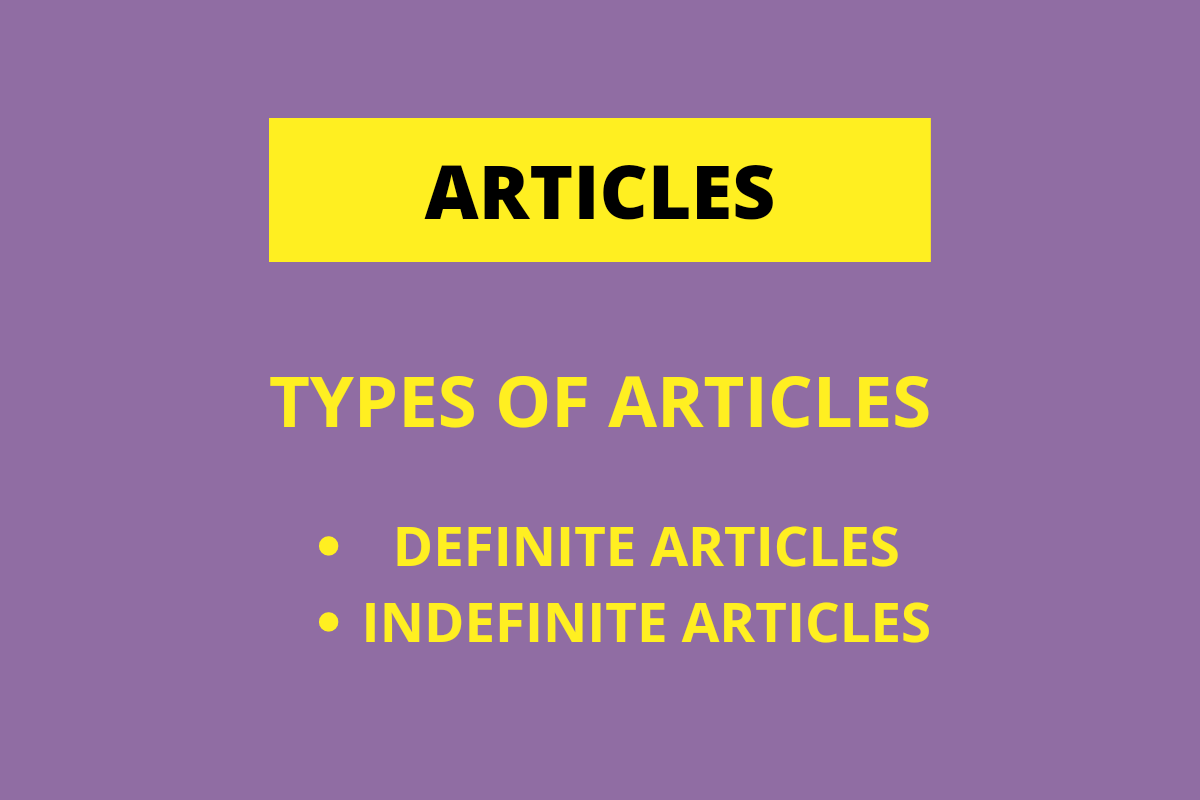Do articles a, an, & the confuse you? Don't worry, in this article, we will clear your confusion. Read this article "Articles a, an, the Rules with Examples" till the end to clear your confusion.
Let's start...
Articles a, an, the Rules with Examples
What is an article in grammar?
Articles namely a, an, & the are very important in English language. Articles are used before nouns to limit or define their context with regard to the sentence. In simple words, articles are used to modify nouns. It's very important to know the exact use of the articles. If you are familiar with the use of the articles, it will help you in your writing skills.
There are two types of articles.
- Definite Articles.
- Indefinite Articles.
Indefinite Articles
A and an is called indefinite articles. These articles are used in the sense of 'one', 'some' & 'any'
Indefinite articles are called indefinite articles because such articles usually leave the person or thing indefinite.
Example: an apple; that is, any apple.
Definite Articles
'The' is known as a definite article. It called so because it is used to point out some particular person or thing. It is used in the sense of 'this' or 'that'. It is used before known nouns.
Example: I have read the book; means some particular book.
Use of Articles Rules with Examples in English Grammar
USES OF DEFINITE ARTICLES
The definite article (THE) is used -
1. When we talk about a particular person or thing or one that is known; as,
- The football that we bought two days ago, is damaged. (Which football? The one we bought two days ago.)
- Let's read the book. (The book which we were reading yesterday.)
2. Before any adjective or noun represent the whole class of persons or things; as,
- The rich must to help the poor.
- The cow is very useful animal. (= Cows are very useful animals.)
- The dog is an incredible swimmer. (=Dogs are incredible swimmers.)
- The parrot loves chilli sauce. (= Parrots love chilli sauce.)
3. Before musical instruments; as,
- I can play the guitar.
- He like playing the harmonium.
- She is very fond of learning to play the Piano.
4. An adverb that's used as a comparative sense; as,
- The more you have, the more you want.
- The higher you get, the colder it gets.
- The sooner, the better.
5. With superlatives; as,
- The highest score.
- The largest city in the world.
- The biggest island.
6. With ordinal numbers; as,
- The sixth grade.
- The nineteenth century.
- The ninth chapter of the book.
7. Before the 'same & whole' & after all & both; as,
- The whole school is going to picnic on Monday.
- All the girls and boys have passed the examination.
- Both the friends have qualified the toughest exams.
- All the sugar is dissolved.
8. Before communities and caste; as,
- The Rajputs are hardworking people.
- The Marathas are very brave.
9. Before any proper noun that's is used for comparison; as,
- Muneer is the Shakespeare of Kashmir.
- Rohit is the Milton of India.
10. With the unit of measurement; as,
- Bananas are sold by the dozen.
- The temperature of water is measured by the celcius degrees.
11. Before the names of some famous book, as,
- The Iliad.
- The Oedipus Rex.
- The Sophocles.
- The Ramayana.
12. Before inventions; as,
- The internet.
- The telephone.
- The web 3.0
- The artificial intelligence.
- The television.
- The computer.
- The radio.
13. Before the dates; as,
- The 20th of May.
- The 5th of June.
- The 25th of January.
14. Before the armed forces; as,
- The Navy.
- The Police.
- The Army.
- The Air force.
15. Before the political parties; as,
- The BJP led government.
- The Congress.
- The TMC.
- The PDP.
- The Communist Party.
16. Before any language when it signifies nationality; as,
- The Japanese are very disciplined.
- The Chinese are very industrious.
- The English are very friendly.
17. Before empires, dynasties, wars, revolution movements, centuries; as,
- The Mughal empire.
- The French revolution.
- The Sixteenth century.
- The Civil war.
- The Mongol Empire.
USES OF INDEFINITE ARTICLES
The Indefinite article 'an & a' is used -
1. Before any single person or thing in the sense of any; as,
- A teacher should treat his students as his own.
- This is an apple. ( NOTE: AN IS BEFORE A WORD WITH A VOWEL SOUND AND A IS USED BEFORE CONSONANT SOUND NOUNS.)
- An Umbrella.
- A book.
- I want to have a cold drink.
- Please, get me an ice-cream.
- I know a lawyer.
2. Before any person who is not know to the speaker; as,
- A Mr. Yawar = Some Mr. Yawar
- A Mr. Rohit = Some Mr. Rohit
3. Before the verbs used as nouns; as,
- For a ride.
- For a walk.
- For a talk.
- For a rest.
4. Before the adjectives 'little' & 'few' when the adjectives gives the sense of some; as,
- I have a very little money to pay the bill.
- Please give me a little sugar.
- I met a few English honor's students in the college.
5. Before the words denoting numbers; as,
- Thanks a million.
- Thanks a bunch.
- A dozen.
- A million.
- A hundred.
Words that start with vowels but don t use 'an'
- European Union.
- Union.
- Unicorn.
- Eulogy.
- URL.
- uniform.
- unit.
- Euro.
- Uranium.
- Utensil.
- University.
- Ewe.
- One
Words that start with consonants but use 'An'
- Honour.
- Heir.
- Honest.
- Honorable.
- Honorary.
- Hour.
- HIV.
- M.L.A
- M.A
- NCC.
- X-ray.
- X-Mas.
- LPG.
When Should we not use Articles? - Omission of Articles
The article is not used -
1. Before proper nouns; as,
- Delhi is our national capital.
- Shakespeare was the greatest poet and novelist.
- Mount Everest the highest peak in the world.
2. Before plural countable nouns in general sense; as,
- Children like to play games.
- Books are one's best friends.
- Mobile Phones are very useful in today's world of technology.
3. Before launguage; as,
- I like to speak English.
- We are learning English language.
- We speak Kashmiri at home.
4. Before hobbies, professions & sports; as,
- Swimming is my hobby.
- Dancing is my profession.
5. Before diseases; as,
- Cancer is a very dreaded disease.
- AIDS is a communicable disease.
6. Before parts of the body; as,
- Liver is the largest organ in our body.
7. Before regular meals except when preceded by adjective; as,
- I take breakfast at 7 a.m.
- They will serve us breakfast.
- You should take dinner.
- A good dinner is very beneficial for one's health.
- They had a very good launch.
Articles in Grammar Examples
- India is the largest exporter of Jute.
- The British empire ruled India for about 200 years.
- Go to the market & buy me an apple
- Do you know how the internet works?
- The BJP has won the elections.
- I have the Iliad.
- A person should be honest.
- I have a mobile device.
- I have a packet of chips.
- I want to become a teacher.
- He is studying in the sixth grade.
- Let's go for a walk.
- Have you finished reading the book that you bought a month ago
- I want to buy an expensive car.
- Do you have a car?
- Let's have an ice-cream.
- Do you want a glass of orange juice.
- I want to have a glass of water.

